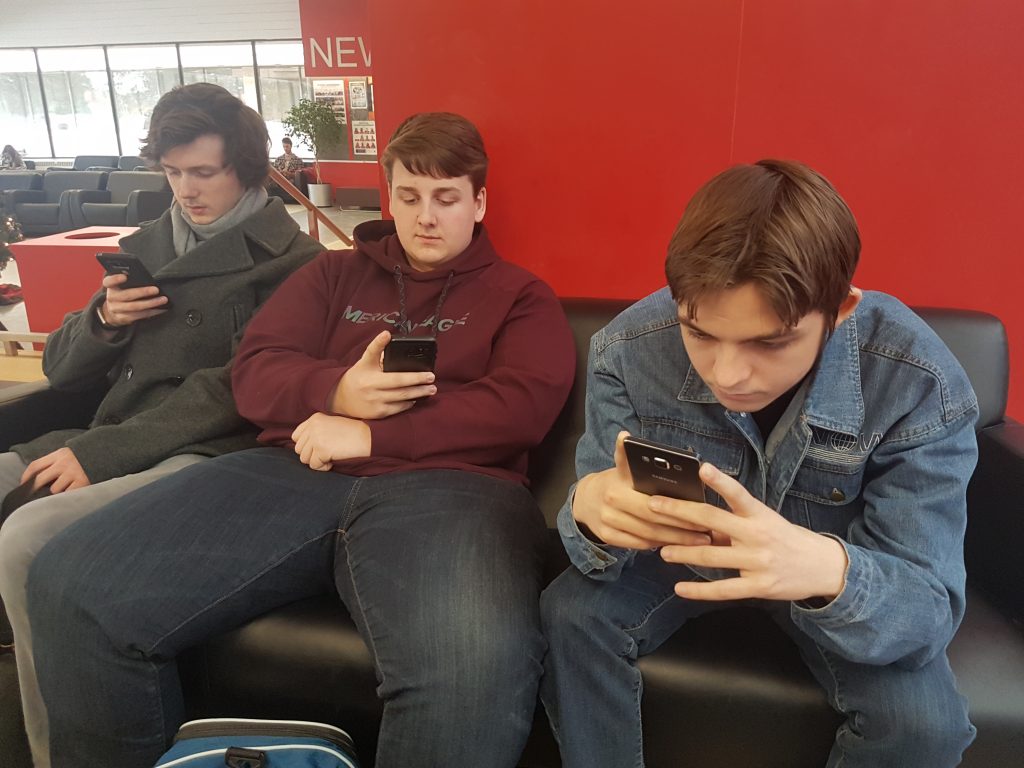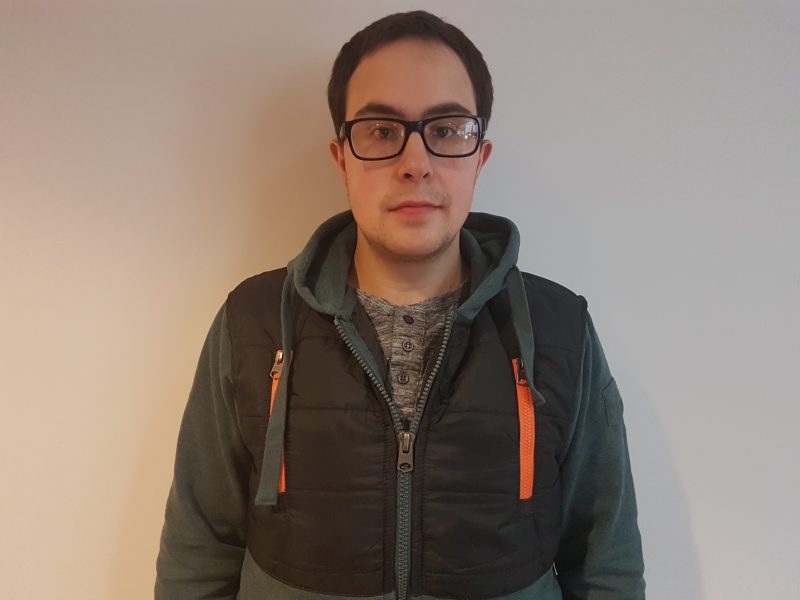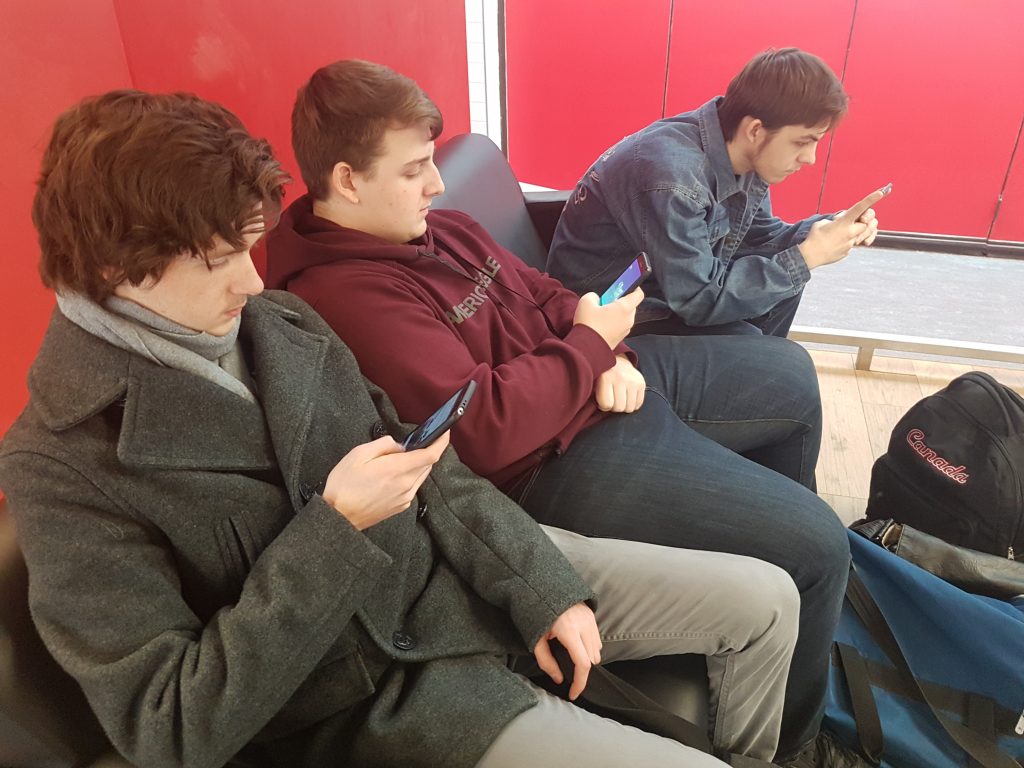Smartphone addiction is a user problem, not a corporate one, Loyalist student says

Collin Goodwin, Jackson Dafoe, Chase Tindale , photo taken in the cafeteria at Loyalist College. <i>Photo by Matthew Morgan.</i>
BELLEVILLE – People need to be responsible users of mobile devices, while companies should not be liable for potential addictive use, Loyalist College students said this week.
Concerns about the possibility of smartphone addiction has been raised by investors against Apple recently.
Before cellphones were used just for talking on-the-go or sending and receiving simple texts. These days, however, they are capable of much more. Many people spend hours on their devices every day. That has led to some concern that people are becoming addicted to their mobile devices.
New York-based Jana Partners LLC and the California State Teachers’ Retirement System sent an open letter to Apple asking that the company offer more choices and tools to help children fight addiction to its devices.
The letter reads in part: “Apple can play a defining role in signaling to the industry that paying special attention to the health and development of the next generation is both good business and the right thing to do.”
QNetNews spoke with six different students to find out how they use their cellphones.

Terri-Anne Ford,18, second-year student, television and media productions. <i>Photo by Matthew Morgan.</i>
Terri-Anne Ford, 18, a second-year student taking television and media production, said she uses her cellphone every day and it’s her go-to device.
“I use it for like text and calling and Facebook and stuff,” she said. “I probably pull out my phone about 10 times an hour to check it. It’s always somewhere close enough that I can just grab it, like (in my) pocket or purse.”
“I don’t know if they should monitor it, but I guess it would be cool if they did offer such a feature,” Ford said when asked if the cellphone provider should bear some responsibility for the overall use of a cell phone by their customers.
“I’m sure some people are on their cellphones way more than they should be,” she said.
She said that she feels that it should be up to the customers and not the cellular providers in how much or how little someone decides to use their cellphone.

Kiara Kirby, 18, second-year student, development service worker. Photo by Matthew Morgan.
Kiara Kirby, 18, is in her second year of studies as a development service worker.
She said that she owns an Apple iPhone and that she uses it all the time.
“It kind of depends on where I am, and what I am doing. If I’m at home or doing homework then probably not so much,” she said.
Users are responsible for managing their own usage, she said.
“Personally, I don’t think it would make a difference. Again it depends on the person and how much they would use it.” Said Kirby.
She said that it could be great if cellphone providers offer a feature to its customers that allowed them to limit use. However, she also feels that it should be the customer’s responsibility in monitoring their overall usage of their cellular device.
“Our generation is always on their phones,” she said.

Dillon Henriksen, 25, second year, television and new media productions. Photo by Matthew Morgan.
Dillon Henriksen, 25, a second-year television and new media production student said he is not always on his cellphone, and that he is on it mainly to kill time.
Henriksen said he is a smartphone user, but that he is “not tied to the hip to it.”
“I use it for YouTube videos and Netflix,” he said.
He said that it is his go-to device for streaming when he is on-the-go.
“Hourly, I would say I use my cell around 10 to 20 minutes per hour,” he said.
Henriksen said he has noticed cell phones being misused by his fellow classmates. He realizes the potentially damaging effects that they can cause in regards to students and their focus levels. He said it is always initially up to the providers to increase or decrease their plans and data rates for their customers.
“I guess it should be up to the consumer,” he said.

Collin Goodwin, 20, first year, biotechnology technologist. Photo by Matthew Morgan.
Collin Goodwin, 20, a first-year student in the biotechnology technologist program, said he owns a Samsung model cellular device, and that on average he spends more than six hours a day on his cellphone.
“When I’m at home I’m always on it,” he said. “When you use it for your studies, you can get sidetracked with everything else that’s on it,” he said.
When asked about controlling usage, Goodwin said “well, the customers are the ones paying for it, so I believe that it should be up to them,” he said.

Jackson Dafoe, 18, first year student, chemical engineering. Photo by Matthew Morgan.
Jackson Dafoe, 18, a first-year student studying chemical engineering, said he is the owner of a Samsung smartphone and that he prefers Android devices.
Dafoe said that on average he spends about two hours per day on his cellphone. He said that uses his cellphone for games but mainly for texting and calling.
“I don’t think it should be up to the providers to take on responsibilities of how much a customer should be able to use their phones, because that takes away from the freedom of the customer,” he said.
“I do think it could be beneficial in ways though for the parenting side of things if the provider could offer limited time for when the kids are on their phones.” Said Dafoe.
Dafoe also said that other than talking and texting that he also uses his cellphone for Instagram, other social media outlets and gaming at times when he is bored.
“I think that it’s more up to the consumer. They’re the one that is paying the providers,” he said.

Chase Tindale, 19, first year student, biotechnology technologist. Photo by Matthew Morgan.
Chase Tindale, 19, a first-year student studying to become a biotechnology technologist said this LG smartphone is his go-to device and that on average he spends between five and seven hours per day on his cellphone.
“My girlfriend lives in Ottawa, so a lot of my time on my cellphone is spent talking to her. There are nights where I’ll spend three hours on the phone just talking with her,” he said
“It doesn’t really hamper school. I use it a little bit in class when I’m not paying attention, but it really doesn’t affect my studies much.”

Collin Goodwin, Jackson Dafoe, Chase Tindale , photo taken at the cafeteria area inside Loyalist College. Photo by Matthew Morgan.
 Print This Post
Print This Post






